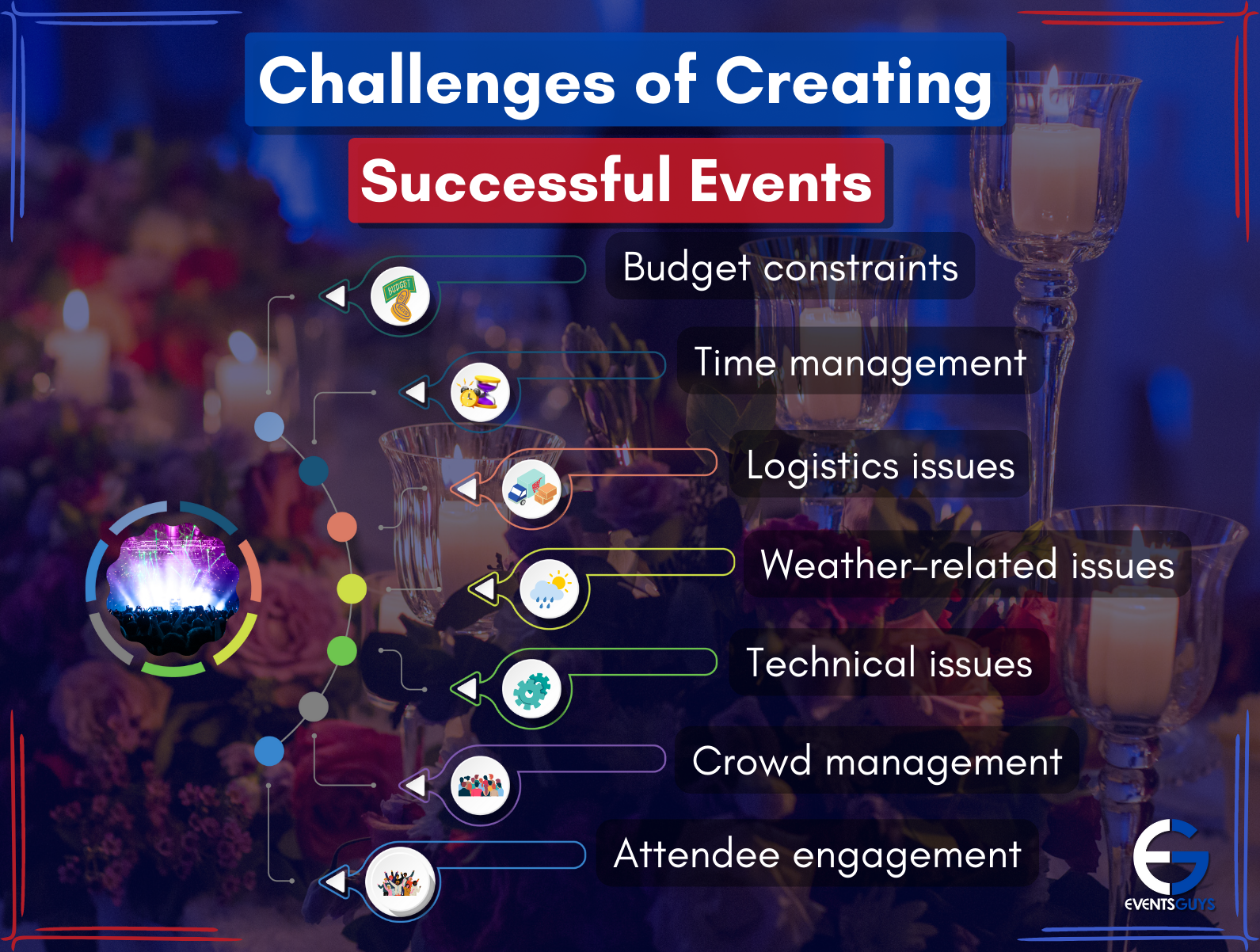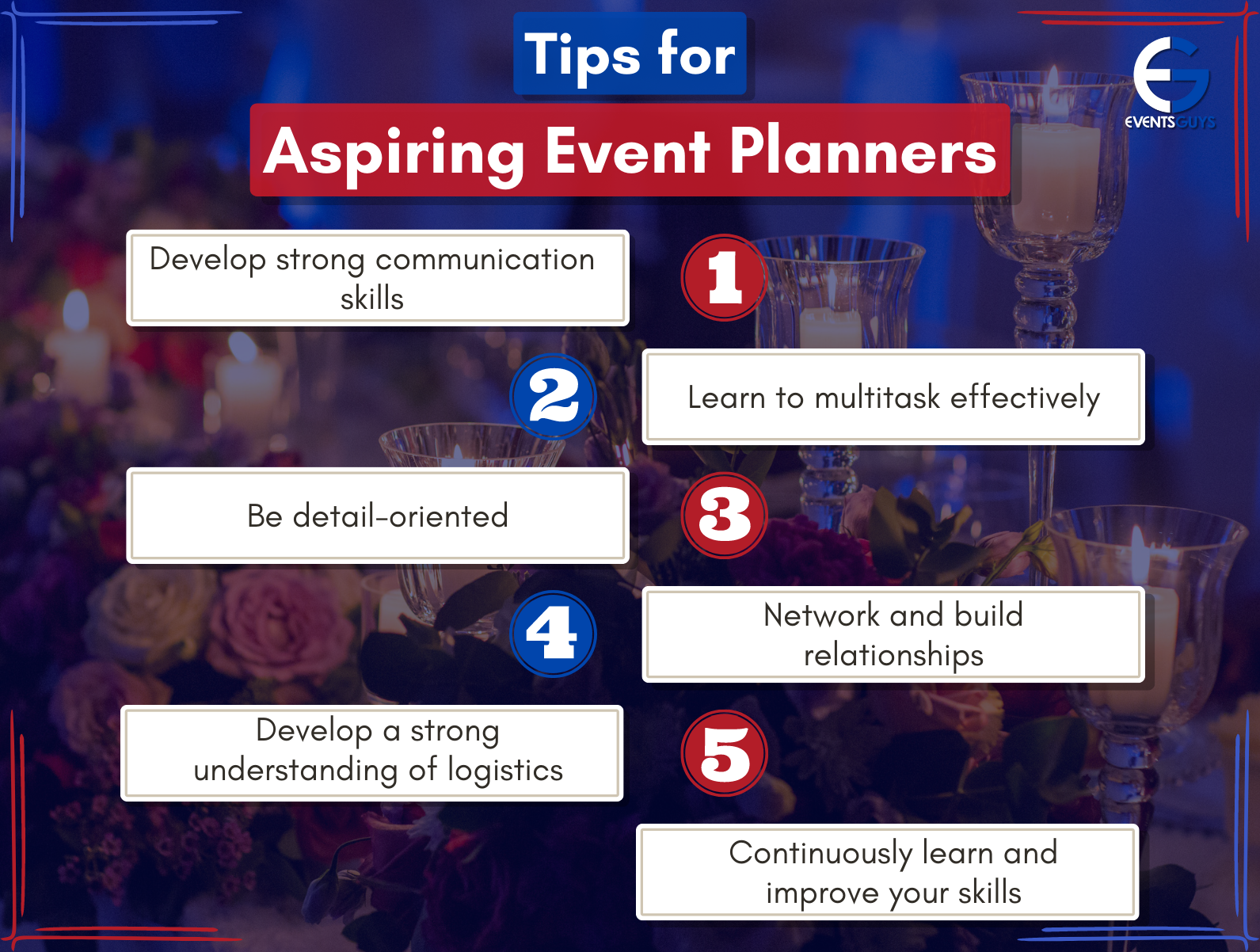Behind every successful event is a team of professionals using their imagination, experience, and innovation to curate and coordinate every detail. They work tirelessly to create a masterpiece of memories for the event attendees.
We incorporate this motivation into Events Guys, our 15 years old Events Hiring Solutions Company in South Africa. From lighting to decoration, music to catering, we seamlessly curate all intricate details of your event to craft a captivating experience for your event attendees.
So, read out this blog post and discover more about the behind-the-scenes of events companies and how they create a symphony of lights, sounds, and sensations to transport guests to another realm.
Challenges of Creating Successful Events

Understanding the Client’s Vision
Understanding the needs of a client is critical in event planning and execution. It enables Event Organizer companies to design and deliver bespoke event services for their customers. Here are some steps emphasizing this discussion:
Gathering Information about the Client
It is the first step in event planning and involves the following steps:
➜ Gathering information about customers’ vision, preferences, and expectations.
➜ Understanding the Client’s brand, target audience, and budget.
➜ Information about the Client’s Past events.
This information allows the events companies to tailor their approach and create personalized events reflecting their client’s styles and visions.
Identifying the Purpose of the Event
Once the Event Companies gather information about the client, they define the purpose of an event to create a meaningful experience. It involves determining the reason behind the event and the client’s expectations. Once the purpose gets determined, events companies create a detailed & cohesive plan that resonates with each aspect of the event and can help pull off a memorable event experience.
Establishing Objectives and Goals
By establishing the objectives and Goals of an event, Event management companies create a strategic roadmap that guides every aspect of the event and provides clear directions for event planning decisions. These Objectives and Goals of an event planner should be measurable, specific, relevant, achievable, & realistic and should align with the purpose of an event. Once these goals get established, Event planning companies can develop a framework defining the final design of the event.
Designing the Event
Designing the event is crucial in event planning and involves creating aesthetically appealing event experiences. Events management companies use different elements to create detailed plans for a memorable event.
Some steps used by the best Event Management companies in designing the functions are as follows:
➜ Determining the Event’s theme.
➜ Developing aesthetic mood boards involving colour schemes, lighting, and decoration.
➜ Planning Multimedia Displays (videos, slideshows).
➜ Incorporating interactive elements for the event (photo booths and games).
Besides, designing an event involves paying attention to the design of the critical elements of events. For example, developing a budget, choosing a venue, developing the event layout, and selecting the vendors & suppliers.
Planning the Logistics
Planning the logistics is an essential step in an event planning process that involves coordinating the necessary elements of the event to ensure there are no hurdles. It includes coordinating various aspects of the events, for example, accommodation, transportation, catering, and equipment rental services.
Here are some steps involved in planning logistics for the events:
➜ Identifying the logistical requirements of the events. Such as the number of attendees and event duration.
➜ Developing a logistic plan covering all factors. For example, transportation arrangements, catering, and equipment rental.
➜ Locking deals with vendors and suppliers who can provide logistical services. These companies include hotel accommodations, transportation companies, and vice versa.
➜ Coordinating different aspects of logistics and making a schedule that involves all the relevant aspects.
➜ Ensuring that stakeholders are aware of their roles and responsibilities.
➜ Handling event registrations and ticketing.
➜ Continuously managing and monitoring the logistical operations of the event.
➜ Evaluating the performance of the logistic plan and gathering feedback from event Attendees to improve the services in upcoming events.
Marketing and Promotion
Effective marketing and promotion are the keys to the success of a public event. These components generate buzz and excitement around the event, increase attendance, and help the brand’s message reach the right people.
Event companies use a wide variety of promotional methods to attract attendees. These strategies include using social media, email marketing, and influencer Marketing.
Here are some steps utilized by events management companies to create exceptional event experiences using Marketing and Promotion techniques:
➜ Defining and understanding the target audience.
➜ Designing a Marketing plan that outlines the Promotion channels, budget, and the type of promotion methods.
➜ Hiring people to create compelling content such as visuals and other fun activities.
➜ Utilizing Social Media to generate interest among the target audience. Some popular social media channels include Twitter, Facebook, Instagram, and LinkedIn.
➜ Evaluating the success of Marketing methods using Analytical tools. The metrics that a full-service event company tracks include social media engagement, website traffic, and ticket sales.
Event Execution
Event execution means managing the event on the day of the event. Events companies seamlessly bring all the elements together and create an unforgettable ambience for the audience.
Event execution involves putting all the resources and event planning into action. It includes overseeing the setup and arrangement at the event venue, coordinating stakeholders, and managing the timeline of the event-related tasks.
Some steps used by Event management and hiring companies are as follows:
➜ Setting up the Venue (Cleaning and seating arrangements)
➜ Managing Logistical Operations during an event.
➜ Coordinating and Communicating with the team.
➜ Attending to the audience and providing assistance if needed.
➜ Monitoring the event attendance and addressing any issues if present.
➜ Wrapping up the event and identifying areas for improvement.
Overall, event execution requires careful attention to detail and strong organizational skills. By ensuring flawless event execution, event companies help their clients achieve their goals and create engaging event experiences.
Post-Event Evaluation and Analysis
The success of an events companies is incomplete without a thorough post-event analysis and evaluation. It allows the event companies to identify areas for improvement to help them create better event experiences in the future.
The Post-Event Evaluation done by event companies include the following:
➜ Gathering feedback from attendees, sponsors, vendors, and the team.
➜ Analyzing the audience-related information through attendance patterns and demographics.
➜ Calculating the Return on Investment (ROI) of the event.
➜ Identifying the strengths and weaknesses of a company.
➜ Developing an improved action plan for future events.
Overall, post-event analysis is a critical component of event planning. Through feedback and analytical data, event planning companies can make data-driven structures that resonate with the latest technology and help clients achieve their goals.
Tips for Aspiring Event Planners

FAQs:
What is the role of an Event Company?
An Event organizer & Management company plans and executes a wide range of events, for example – weddings, Corporate Events, Concerts, and Conferences. Its primary role is to work with the client’s vision and manage all the aspects of the event management, from initial planning to the final event execution.
The responsibilities of an Event Company include managing Vendors, coordinating logistics, managing budgets, designing creative elements, and vice versa.
How do Event Companies come up with creative event ideas?
Event Management Companies use a variety of strategies to come up with creative ideas. They collaborate with vendors and other industry professionals, brainstorm ideas as a team, analyze the client’s brand, and research industry trends for their creative event production.
What are some examples of Innovative Event Planning?
Innovative Event planning is all about thinking outside the box and incorporating unique elements into the framework of an event. Here are some examples of these creative elements:
- Using Interactive Displays such as Virtual Reality (VR) experiences.
- Creating personalized experiences like customized beverages.
- Incorporating Surprise elements like pop-up shows and guest speakers.
- Using Hybrid event technologies to allow remote event participation.
How do Event Companies handle unexpected situations during an event?
Event Planner Companies handle unexpected situations using flexibility, adaptability, and quick thinking. They develop a contingency plan before an event. It outlines all emergency response plans, protocols, and other instructions to handle problems during events. In addition, Events Companies have professionals on board trained to assess and handle unexpected situations.
What Qualities should you look for in an Event Company?
There are several qualities you should look for in an event company. Some of them are the following:
- Relevant Experience
- Expertise
- Portfolio of Successful Events
- Creativity & Innovation
- Communication Skills
- Commitment to Sustainability
- Customer Service Skills
What Techniques and Strategies Do Event Companies Use to Create Unforgettable Experiences?
When it comes to organizing remarkable events, event companies rely on the expertise of a top event planner for unforgettable experiences. These professionals utilize various techniques and strategies to deliver unforgettable moments. They focus on meticulous planning, innovative ideas, seamless execution, personalized experiences, engaging entertainment, effective communication, attention to detail, and creating a unique atmosphere. With their knowledge and skills, these expert event planners guarantee an unforgettable and memorable experience for all attendees.
How Does Technology Play a Role in Creating Unforgettable Outdoor Events?
With the rapid advancement in outdoor event technology solutions, creating unforgettable outdoor events has become easier than ever. From state-of-the-art sound systems to immersive lighting effects, technology has transformed the way events are experienced. The use of interactive displays and smart event apps ensures seamless coordination and enhances attendee engagement. Moreover, live streaming and social media integration allow events to reach a wider audience, making them truly unforgettable.
Conclusion – How Events Companies Create Unforgettable Experiences
In Summary, Event Companies play a vital role in the success of an event, small or big. By exploring the behind-the-scenes of Events Companies in this blog post, it is clear that teamwork is the cornerstone of any sensational event.
Whether it’s a wedding, corporate event, or a music festival, Event Management Companies deliver extraordinary results because they have the resources, expertise, and creativity as their assets.
Lastly, if you are looking for Event Hiring Services in South Africa, contact us at Events Guys and be ready for memorable experiences at your upcoming events.

